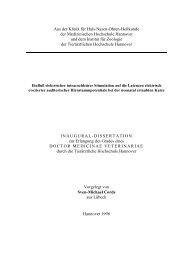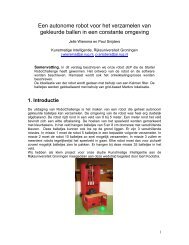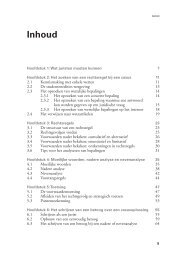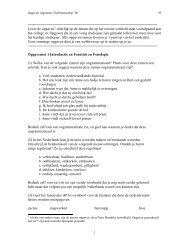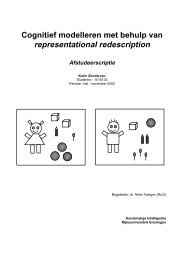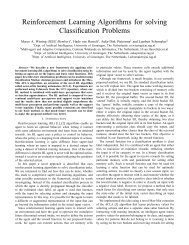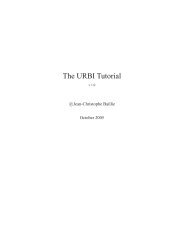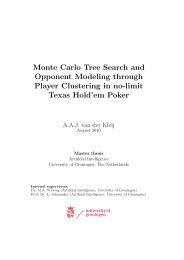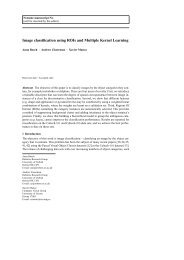Presuppositions in Spoken Discourse
Presuppositions in Spoken Discourse
Presuppositions in Spoken Discourse
You also want an ePaper? Increase the reach of your titles
YUMPU automatically turns print PDFs into web optimized ePapers that Google loves.
Chapter 2<br />
updated context is subtracted from the orig<strong>in</strong>al context. In this example, we first<br />
update c to obta<strong>in</strong> all worlds where Julia does have a bicycle and then we subtract<br />
this context from the orig<strong>in</strong>al c. The result is all worlds where Julia does not have a<br />
bicycle.<br />
If a presupposition is not def<strong>in</strong>ed <strong>in</strong> the context then try<strong>in</strong>g to update will<br />
result <strong>in</strong> undef<strong>in</strong>edness. But fortunately the satisfaction theory has a way to get<br />
around this by us<strong>in</strong>g some additional rules that allow for presupposition<br />
accommodation. Let’s pretend we need to update an empty context with the<br />
follow<strong>in</strong>g sentence:<br />
(56) Julia’s bicycle is red.<br />
We start with an empty context c. The sentence we want to update with conta<strong>in</strong>s<br />
the <strong>in</strong>formation contributed by the def<strong>in</strong>ite NP Julia’s bicycle and this presupposes<br />
that Julia has a bicycle, p. So updat<strong>in</strong>g c become c+[S{p}]. First we have to test if<br />
the presupposition is satisfied <strong>in</strong> the context. Because the context is empty the<br />
answer must be no; c still conta<strong>in</strong>s worlds where Julia doesn’t have a bicycle. But<br />
we can pretend that the context already <strong>in</strong>cluded the presupposed <strong>in</strong>formation by<br />
revis<strong>in</strong>g the context c to a context that satisfies the presupposition by tak<strong>in</strong>g on<br />
those worlds where Julia has a bicycle, a revised context we can call c’. Then we<br />
update with S us<strong>in</strong>g c’+[S{p}] rather than c. The presupposition is satisfied <strong>in</strong> the<br />
revised context and the sentence can be processed without any problems.<br />
Accommodation is less straightforward <strong>in</strong> the satisfaction theory when<br />
deal<strong>in</strong>g with presuppositions triggered under embedd<strong>in</strong>gs. If we take an example<br />
where a presupposition is triggered under negation, we can illustrate both local and<br />
global accommodation. Look at the follow<strong>in</strong>g example:<br />
(57) S: Julia’s bicycle is not red.<br />
We start with a new context c and then we analyze the sentence S. S <strong>in</strong>duces the<br />
presupposition p that Julia has a bicycle. Because we have an empty context we<br />
know that the context we are deal<strong>in</strong>g with conta<strong>in</strong>s not only the worlds where the<br />
presupposition is true, but also where it is false (e.g. because an empty context<br />
conta<strong>in</strong>s all possible worlds, it conta<strong>in</strong>s worlds where the presupposition is both<br />
true as well as those where the presupposition doesn’t hold). We want to evaluate<br />
our sentence only <strong>in</strong> those worlds where the presupposition holds so we have to<br />
first remove the worlds where the presupposition is not true. Note that accord<strong>in</strong>g<br />
to the rules of embedd<strong>in</strong>g given above the update of the context c+[ ¬S{p}] = c –<br />
(c+[ S{p}]) = c’. We can accommodate the presupposition globally or locally.<br />
Global accommodation of the presupposition <strong>in</strong> c – (c+[ S{p}]) amounts to<br />
revis<strong>in</strong>g both contexts, <strong>in</strong> effect c+p – (c+p+[S{p}]). Thus, contextual update<br />
with S is then performed only on the set of worlds where the presupposition is<br />
satisfied. In our example this would amount to first tak<strong>in</strong>g only the worlds where<br />
Julia has a bicycle, and then updat<strong>in</strong>g with the <strong>in</strong>formation that the bicycle is not<br />
36



